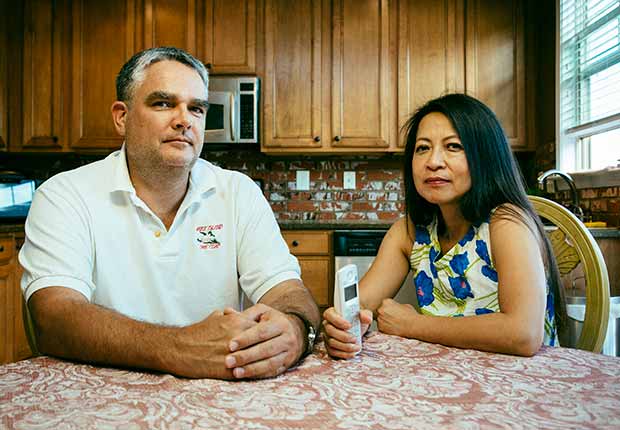AARP Eye Center

By Drew Jubera
Lu Hsieh got a call one morning from somebody claiming to be with the IRS. The man on the line told Hsieh she owed back taxes totaling more than $6,500. He then added, in a more threatening tone, that she had to pay the shortfall immediately.
Hsieh turned to her husband and told him what the caller was saying. Hsieh’s husband prepares the couple’s taxes and knew it wasn’t true. He knew the IRS informed taxpayers through letters, not threatening phone calls. So he told her to hang up.
Hsieh was reluctant. After all, it was the I-R-S! So this time her husband shouted loud enough for the caller to hear: “Hang up!”
She did. Yet enough people stay on the line—and give bank account or debit card information over the phone—that this scam has become common during tax season. Even Hsieh, who’s always cautious about calls from strangers and who has worked as an AARP anti-fraud volunteer, was momentarily caught off guard.
“People need to be aware,” said Hsieh, 50, from Suwanee. “They’ll use intimidation tactics. They’ll sound like the Mafia. You don’t want to talk to them.”
The AARP Fraud Watch Network helps make people more aware of these scams and other attempts to defraud Georgians of all ages. The free online service at aarp.org/fraudwatchnetwork provides alerts on activity in specific areas, prevention tips and stories of scams from regular folks to help others avoid them.
Downloads include “The Con Artist’s Playbook” and the e-book Protecting Yourself Online for Dummies. The Fraud Watch Helpline (877-908-3360 toll-free) assists those who have already become victims.
AARP also conducts workshops to demonstrate different tactics that scammers use and holds shredding events where people can dispose of documents that contain crucial ID information.
This watchdog service is especially relevant in Georgia. The state ranks second nationally for fraud complaints and fifth for identity theft complaints, according to the Federal Trade Commission’s Consumer Sentinel database.
Vulnerable targets
“Georgia is getting hit particularly hard,” said Serena Garcia, communications director for AARP Georgia. “AARP is arming Americans with tools they need to spot and avoid scams—to protect themselves and their families.”
Though everyone is vulnerable, older residents can be targets, volunteers say. Often they grew up in a more trusting time, live alone, get out less frequently or are less adept at technology—circumstances that scammers can exploit.
“Seniors have this air of looking for the best in people, have a more trusting nature and tend to give people the opportunity to speak to us without cutting them off,” said Rosie Cecil, 61, a volunteer from Conyers. “Because of all those wonderful qualities, they also become vulnerable. They think the person on the phone is their friend. They’re not their friend.”
Volunteers warn of unknown callers who ask personal questions, such as whether your spouse is still alive. Scammers often attempt to earn your trust before bringing up an investment opportunity, a refund you might be due or a security system they’d like to sell you.
If they claim to be calling from your bank or utility and need your account number, tell them you’ll call the bank or utility yourself. Be judicious about what you post on social media, such as birth dates or vacation photos on Facebook. That can be valuable information to potential thieves, Fraud Watch volunteers warn.
But the best advice, they say, is ageless.
“If at first you think it’s fishy,” said Jim Bass, 70, a volunteer in Macon, “nine times out of 10, it’s fishy.”
To volunteer for Fraud Watch or request a workshop, call Charima Young at 404-870-3785 or email ccyoung@aarp.org.
Drew Jubera is a writer living in Atlanta























































